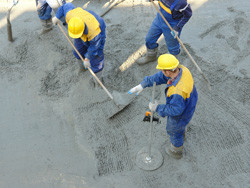New technology for the concrete industry
The concept involved both on-site and prefabricated elements and both load-carrying and facade elements. The project 'New industrial technologies for tailor-made concrete structures at mass customised prices' (TAILORCRETE combined the knowledge resources of architects, designers, concrete technologists, civil and structural engineers, and robot experts. To enable a seamless data flow from file to factory, a digital design tool was developed. This technology for casting concrete using robotics replaced the use of traditional formwork, enabling greater flexibility in producing singular concrete structures with different geometric designs. TAILORCRETE transitioned from rectangular form construction to new industrialised production of unique concrete structures without the need for expensive and labour-intensive manual construction processes. A crucial factor for the casting of complicated structures is the availability of self-compacting concrete. This material allows all corners of the formwork to be filled without vibration. Weaknesses of the project included the physical separation of some collaborating partners. Also, some system and technologies require high investments in order to achieve certain production capability to ultimately improve cost efficiency in production. Project results were widely disseminated. This was achieved through participation in seminars and conferences, scientific papers and trade magazines, a website, a private industry group and an informational brochure. This project achieved a balance between research and innovation capability versus industrial knowledge and application experience. All results have been validated in full-scale use cases, with solid conclusions gathered related to their potential exploitability or the necessary improvements.
Keywords
Concrete industry, construction, formwork, industrial technologies, concrete structures



